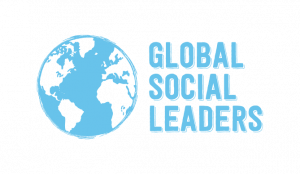We are delighted to share a blog written by Hannah Graham, a student at International School of Beijing who is part of a team delivering a Global Goals project for the 2018-19 Global Goals Competition.
Their project is among over 620 social action projects currently running as part of the GSL movement and we are excited to be supporting them to design and lead positive social change in their community.
We are so appreciative of this opportunity to make an impact through the cultivation and application of powerful real-world skills.
Project Overview
Every day, the trash collected in the 230 trash cans at ISB are taken out by Sodexo workers and transported to the school dumpsite. There are two kinds of trash cans that we have: labeled “recycling” and “other”. These trash cans, being relatively small, are overflowing at lunchtimes in student-dense locations, mainly near the school entrances and cafeteria. Furthermore, if you take a look into the trash cans, you would notice they contain the same things: food delivery boxes and bags, plastic bottles, paper. What was deeper down the iceberg was where this waste was going: the waste from both these trash cans were being combined and put into a larger bag, sent to the dumpsite to be taken to the landfills or incinerator. All the members of our group had seen this happen at one point or another, and even before we had initiated this project, it was a topic of long conversation.
We discussed with our supervisor and the facilities office at our school, ultimately agreeing something had to be done. Fortunately, with the administration on board, a contract was quickly made with a vendor that would recycle aluminum, organics, tetrapak, plastics, and paper. To be a part of the long process of bringing recycling to ISB, our goal was to set up an effective system at our school from waste being disposed of in the proper trash cans to being correctly distributed into a more organized dumpsite for the vendor to receive. We also wanted to design new trash cans labels that would raise awareness of the different divisions of trash.
Our Journey
As our project developed, we faced many challenges that required patience and determination to overcome; however, through doing so we have gained valuable skills which we are enormously thankful for. One of these skills was of oration, since we had to propose our ideas to the facilities office and our peers. Learning how to adjust our presentation style with the change in audience was an important aspect to the success and acknowledgment of our project. The conventions and formalities of the events, presenting in front of both the facilities and student body, created an experience from which we were able to learn valuable skills to a successful presentation that enraptured our audience.
Having strong presentation skills are not enough to determine the success or failure of our project. Networking is another major skill that establishes connections between different individuals with various skill sets. ISB students have access to many resources; however, independence and initiative will truly determine whether we utilize these resources.
Managing the design component of our new trash cans was a test of our networking skills. There is a graphic design club at our school, and we reached out to them to collaborate on this aspect of our project. Though it was difficult to identify an individual artist, a face-to-face conversation helped us express our wants and needs; in turn, we were able to work together seamlessly. Another challenge we encountered while collaborating with an outside member was finding the time to work together. We overcame this obstacle by organizing weekly meetings so both sides stayed up to date.
We did not have direct supervision from our supervisor, so communication, collaboration, and time-management were crucial elements to our group work. As a result of planning presentations and proposals together, we grew closer – serving as a key factor in our success.
The Next Chapter
After achieving a myriad of our project objectives, we not only gained more experience, but our group also realized the impact a small group of people can have on a large community. Therefore, we firmly believe our peers should join our mission and help our community become more sustainable. We urge individuals to tackle similar projects to gain knowledge and experience that cannot be obtained in regular classroom environments.
These experiences expand our world-view, and we believe that our peers should return gratitude to our environment – it is our responsibility to care for our surroundings.
It is our responsibility to maintain this environment, make sure others are able to grow in the same fruitful community. Doing even the smallest bit of work to help our community and the world become more environmentally friendly shows our motivation and determination to maintain the land as it is, not letting it degrade any further. To that end, we see how bright the future will be if everyone does a little bit in protecting this world, taking one step into creating a better future for ourselves and each other.
The 2018-19 GSL Global Goals Competition is now open and runs until June 2019. If you belong to one of the 700+ teams of students currently delivering a social action project as part of the competition we would love to hear from you and feature your blog and project photos on our website to inspire others.




